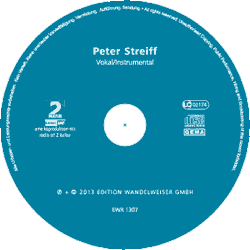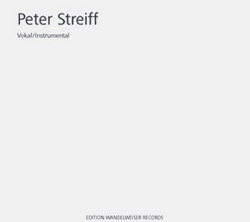EDITION WANDELWEISER RECORDS
> CD catalogue
_____________________________________________________________________
<< >>
Peter Streiff
Vokal / Instrumental
| order reference:
medium: composer: performer: |
EWR 1307 CD Peter Streiff vocal/instrumental |
 |
 |
>> Review Le Son du grisli (blog) >> Review Brian Olewnick (blog) Six songs (1976) for voice, violin, clarinet, piano, cello, harp, and guitar; based on poems by Jean Gebser (1905-1976). The philosopher conveys his core ideas in lyrical language, where form, linguistic rhythm, inflections of speech and mea- ning become an essential part of the musical design. Floating relationships of pitches continue to change from one mode to the next, firmly anchored in their sound universe. The passing of time is crafted only through the pulsating sounds, con- nected through various tempi. The result is music of freely dramatic gestures. Melodies Vol. II (1983) for a reed instrument, version for oboe d’amore. 31 calmly floating monodic figures increase and decrease in length. The composed sound qualities vary throughout the piece in fine nuances. Behind the sensory percep- tion lies a multi-layered system of order based on eleven musical qualities, whose common compositional element is that of symmetry. This order dissolves in time and sound space. Nur allein für deine Ohren (For Your Ears Only, 2011) for voice and baroque oboe/oboe d’amore, based on lyrical texts by eight poets from the 13th, 14th, 16th, and 20th century (in this order: René Char, Anonymus, Dschelaladdin Rumi, Francesco Petrarca, Kurt Marti, Anonymus, Kurt Schwitters, Ernst Jandl). A cycle in two voices and 14 parts. The texts of the short to very short pieces are inspired by the ambivalence of love poetry and spiritual allusion. The 14 texts progress from mediated meaning to speech sound free from meaning. Zeitstrahl (Beam of Time, 2010) for aulos, a double-piped instrument, with both pipes tuned to the same pitch. Tireless research and creative productivity of musician Conrad Steinmann and instrument maker Paul Reichlin brought the instru- ment back to life. It now challenges the artistic powers of composers with its qualities and (as we see it today) radically limited possibilities. Studie (Sprachzeichen) (Study / Speech Signs, 1978) for six violins. The piece Fermaten (Fermatas, 1971-72), a very long monodic line, develops into the electro-acoustic music Nachtgedanken (Thoughts at Night, 1975). Overtones in high pitch emerge from the dark deep polyphony. Six different bow strokes of the violins contrapuntally lengthen the sounds into sound colors. Ohrspuren am Drittelberg (Ear Traces on Third Mountain, 2008) for third and semitone grand piano. The piano in third tone tuning goes back to the development of Mexican composer Julián Carrillo (1875-1965). The combination with a traditionally tuned piano produces third and sixth tones in addition to the familiar semitones. The composition explores this constellation of 116 tone pitches and yields them to the ear. Translation: Daniel Dubach, Bern CH
Sechs Lieder (1976), Stimme und 6 Instrumente Anne Schmid, contralto; Elisabeth Grimm, violin; Meinrad Haller, clarinet; André Thomet, piano; David Inniger, violoncello; Virginia Arancio, guitar; Vera Schnider, harp Melodien Band II (1983), Rohrblattinstrument, Version barocke Oboe d‘amore Katharina Suske, baroque oboe d’amore Nur allein für deine Ohren (2011), Stimme und Barockoboe/barocke Oboe d’amore Duo stimme&oboe: Anne Schmid, contralto; Katharina Suske, baroque oboe d’amore Zeitstrahl (2010), Aulos Conrad Steinmann, aulos Studie (Sprachzeichen)(1978), 6 Violinen Matthias Kuhn, conductor; Elisabeth Grimm, Maximilian Haft, Aina Hickel, Stefan Meier, Regula Schwaar, György Zerkula, violins Ohrspuren am Drittelberg (2008), zwei Klaviere in Drittel- und Halbtonstimmung Klavierduo Kordzaia-Blum: Dominik Blum, piano (Drittelton), Tamriko Kordzaia, piano |
Texte der Vokalwerke Sechs Lieder (1976) Gedichte Jean Gebser (1905-73) Stimme, Violine, Klarinette Klavier, Violoncello, Harfe, Gitarre 1 Wo wohl wohnen wir, wo ist uns Heimat? Auch im Drüben; und hier, irgend an einer Statt des Himmels, der Erde: das ist Vorübergang, nicht ohne Beschwerde und voller Abendklang. Wirkliches Wohnen ist nur im Herzen derer, die lieben; dort ist die goldene Spur heimatlich unvertrieben. 2 All die Fülle des Lebens, all das mögliche Glück, wir suchen es lange vergebens, irgend liegt es zurück, fern in vergangenen Leben, doch einen Ahnung blieb: jenes Nehmen und Geben im Worte: ich habe dich lieb. 3 Immer muss man zueinander reifen. Alle schnellen Dinge sind Verrat. Nur wer warten kann, wird es begreifen: nur dem Wartenden erblüht die Saat. Warten, das ist: Säen und dann Pflegen, ist gestaltend in den Worten warten, handelnd still sein und umhegen erst den Keim und dann den Garten. 4 Nichts, das uns betrübt, nichts, das uns erfreute, auf dem Teiche, früh geübt, spiegelt sich das Heute. Aber was der Blick durchdrang – wars das Gestern, wars das Morgen – ist, da sich das Herz bezwang, ganz im Offenen geborgen. Währenddessen spiegelt sich Wechselndes im Teich, doch in uns entsiegelt sich das geheime Reich und wird offenbare Fülle, und das Herz hält stand, und das Heute ist nur Hülle und nur dürftiges Gewand. 5 Was wir wissen, ist gering. Was das Herz weiss, ist sehr viel. Wenn sich erst ein Herz verfing, ists des Schicksals ernstes Spiel. Und dann gibt dem Schicksal Raum, dessen ruhig, was geschieht: hör, ein Blatt am Weltenbaum singt dir still das Liebeslied. 6 Wir kommen nirgends her, wir gehen nirgends hin; wir ruhen ungefähr im fast erfüllten Sinn. Wir denken dies und das, doch das ist Teil und Schmerz; die Welt ist Welt und Glas und Juli oder März, ist offen und nicht leer, ist Ursprung, nicht Beginn; wir kommen nirgends her, wir gehen nirgends hin. Jean Gebser, Gesamtausgabe Bd. VII Gedichte S. 98-103 © 1980 Novalis Verlag AG Schaffhausen Nur allein für deine Ohren (2010-11) Alt-Stimme und Barockoboe / barocke Oboe d‘amore I René Char (1907-1988) Nombreuses fois René Char, Œuvres complètes © Editions Gallimard, 1983, Bibliothèque de la Pléiade, p.387 II Philippe Desportes(1546-1606) 1.Teil Je pars, non point de vous, mais de moy seulement: Car je laisse mon ame a fin qu’elle vous suive. Et ne vous etonnez que sans ame je vive : Amour me fait mouvoir par son feu vehement. Je ne vous laisse point à ce departement, Bien que vous presumiez n’estre jamais captive : Car je vous port’ au cœur si bell’ et si naïve Que n’avez rien en vous qui n’y soit vivement. Philippe Desportes in J.P. Sweelinck, Rimes françoises et italiennes, Nr. 2, 1612 III Dschelaladdin Rumi (1207-1273) Ohne dein Wort hat die Seele kein Ohr – Hat keine Zunge sie ohne dein Ohr … Übertragung: Annemarie Schimmel, in: Aus dem Diwan, © Reclams Stuttgart IV Philippe Desportes 2.Teil Mais pourtant ma douleur n’est pas là divertie, Car j’emporte de vous, ceste seule partie, Qui refraichit ma pert’, et l’en fait souvenir. Puis je crain d’autre part, sçachant votre rudesse, Que vous receviez mal l’ame que je vous laisse, Et que vous ne veuillez avec vous le tenir. V Dschelaladdin Rumi Bist du da, so schlaf‘ ich nicht, voller Seligkeit; Bist du fern, so schlaf‘ ich nicht, voller Traurigkeit. Preis Gott! Ich wache nun ständig, Nacht für Nacht – Siehe zwischen „wach“ und „wach“ die Verschiedenheit Übertragung: Gisela Wendt, in: Vierzeiler © Castrum Peregrini Presse Amsterdam 1991 VI Francesco Petrarca (1304-1374) Alma felice che sovente torni a consolar le mie notti dolenti con gli occhi tuoi ch Morte non à spenti, Ma sovra ‘l mortal modo fatti adorni : quanto gradisco che’ miei tristi giorni a rallegrar de tua vista consenti ! Così comincio a ritrovar presenti le tue bellezze a’ suoi usati soggiorni, là ‘ve cantando andai di te molt’ anni or, come vedi, vo di te piangendo : di te piangendo no, ma de’ miei danni. Sol un riposo trovo in molti affanni, che, quando torni, te conosco e ‘ntendo a l’ andar, a la voce, al volto, a’ panni. Francesco Petrarca, Canzoniere Nr. 282, S. 150 © Reclams Universal Bibliothek, Stuttgart 2006 VII Kurt Marti (*1921) ist klang der sinn? Kurt Marti, Der Traum geboren zu sein © Nagel & Kimche im Carl Hanser Verlag München 2003 VIII Dschelaladdin Rumi Höre, Worte ohne Zunge sprechen möchte ich; Stumm für alle fremden Ohren sprechen möchte ich. Nur allein für Deine Ohren soll es hörbar sein, Mögen noch so viele Menschen dicht umgeben mich. Übertragung: Gisela Wendt, in: Vierzeiler © Castrum Peregrini Presse Amsterdam 1991 IX Anonym Ivganzito oti un vana vea paga gu zogoto. Un facva gon vonocaqua vo tugavva i doc rafa. X Kurt Schwitters (1887-1945) Sehnsucht Kurt Schwitters, Das Literarische Werk, hrsg. von Friedhelm Lach © 1973 DuMont Buchverlag Köln, Bd. 1, S.88 XI Kurt Schwitters Der keuchende Hunger Kurt Schwitters, Das Literarische Werk, hrsg. von Friedhelm Lach © 1973 DuMont Buchverlag Köln, Bd. 1, S.55 XII René Char Sommeille René Char, Œuvres complètes (p.796) © Editions Gallimard, 1983, Bibliothèque de la Pléiade XIII Kurt Schwitters Ich werde gegangen Kurt Schwitters, Das Literarische Werk, hrsg. von Friedhelm Lach © 1973 DuMont Buchverlag Köln, Bd. 1, S. 41 XIV Ernst Jandl (1925-2000) Jetzt lege ich mich hin Ernst Jandl, Poetische Werke, Peter und die Kuh, hrsg. von Klaus Siblewski © 1997 Luchterhand Literaturverlag München, in der Verlagsgruppe Random House GmbH |